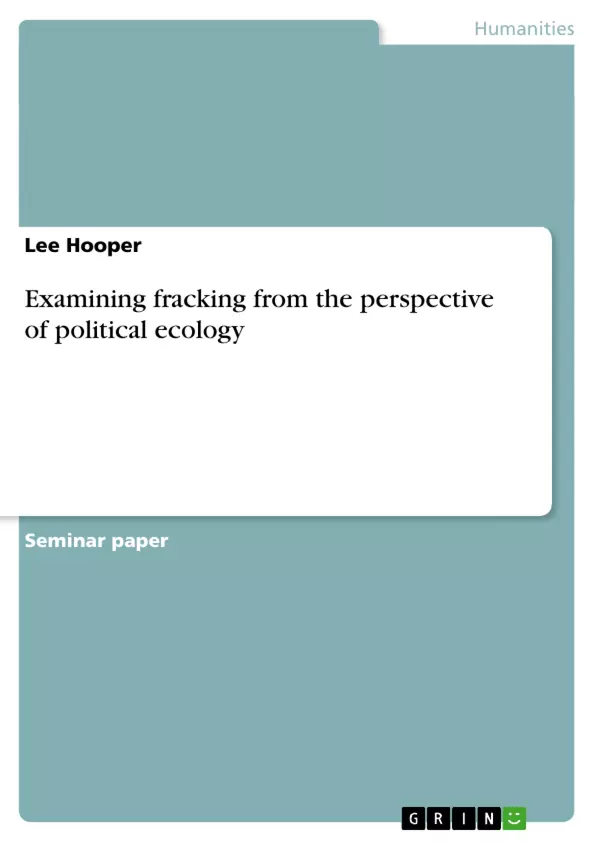Throughout the modern era, particularly with the development of new and innovative technologies, conflict has existed between the environment and those who inhabit it. With the advent of highly industrialised technology during the 20th century conflict has been on a steady increase as there are often dialectical processes involved between those creating technological innovations and those who become unwittingly involved in them. One environmental conflict called hydraulic fracturing, or ‘fracking’ as it is commonly referred to, is a profitable industrial practice whereby natural gas is extracted from rock layers in the ground. Fracking is an environmental conflict arising from economic and political marginalisation based primarily on class divisions. This will be demonstrated first through describing fracking and how it is an environmental conflict, by explaining how fracking fits into a political and economic framework, and by finally outlining the cultural component, that is how marginalised socio-economic and ethnic groups are affected by the practice of fracking. Political ecology theory will be applied in order to gain an understanding of the complexities of fracking as this theory focuses on the mutual development of both political and ecological change. It is acknowledged that whilst applying a political ecology perspective is an effective anthropological method, it is also necessary to apply other anthropological theories in order to gain a more holistic analysis.
Inhaltsverzeichnis (Table of Contents)
- Fracking as an Environmental Conflict
- Political Ecology Theory and Fracking
- Environmental Conflict and Fracking
- The Political and Economic Framework of Fracking
- Capitalism and the Marginalization of Resources
- The Cultural Impact of Fracking
Zielsetzung und Themenschwerpunkte (Objectives and Key Themes)
This essay aims to examine the practice of fracking from a political ecology perspective, highlighting the environmental, political, and social dimensions of this controversial practice. It explores how fracking is an environmental conflict that arises from economic and political marginalization rooted in class divisions. The essay further delves into how fracking fits into a broader political and economic framework, particularly in relation to capitalism and resource control. Finally, it analyzes the cultural component of fracking, focusing on how marginalized socio-economic and ethnic groups are affected by this practice. Key themes explored in the essay include:- The environmental impact of fracking
- The role of political ecology in understanding environmental conflicts
- The connection between capitalism and resource control in the context of fracking
- The social and cultural impacts of fracking on marginalized communities
- The conflict between the interests of private companies and the public in regards to fracking
Zusammenfassung der Kapitel (Chapter Summaries)
- Fracking as an Environmental Conflict This section introduces fracking as a relatively new technological innovation with significant environmental implications. It discusses the documented adverse effects of fracking, including methane gas leaks, water contamination, and potential seismic activity. The section then introduces political ecology theory, explaining how it examines the interaction between the environment and societies, particularly focusing on how political economies and social structures influence environmental degradation.
- The Political and Economic Framework of Fracking This section explores the political and economic context of fracking, connecting it to capitalist ideologies and the principles of private ownership, profit accumulation, and resource control. The essay discusses the trend toward privatization of national institutions, particularly in the energy sector, and emphasizes the role of multinational corporations (MNCs) in acquiring and exploiting resources, often in ways that marginalize local communities.
Schlüsselwörter (Keywords)
This essay focuses on the key concepts of fracking, political ecology, environmental conflict, capitalism, resource control, marginalization, socio-economic disparities, and the cultural impact of industrial practices. It also explores the interconnectedness of political and environmental issues, examining how capitalist structures contribute to environmental degradation and the marginalization of certain groups in society.Frequently Asked Questions
What is fracking from a political ecology perspective?
From this perspective, fracking is seen as an environmental conflict arising from economic and political marginalization, deeply rooted in class divisions and capitalist structures.
What are the documented environmental risks of fracking?
Risks include methane gas leaks, water contamination, and potential seismic activity caused by extracting natural gas from rock layers.
How does capitalism influence the practice of fracking?
Capitalist ideologies promote private ownership and profit accumulation, leading to the privatization of energy resources and the marginalization of local communities by multinational corporations.
Which groups are most affected by fracking?
Marginalized socio-economic and ethnic groups often bear the brunt of the environmental and cultural impacts of fracking due to their lack of political and economic power.
Why is political ecology theory useful for analyzing fracking?
This theory focuses on the mutual development of political and ecological change, helping to understand how political economies influence environmental degradation.
Is fracking solely an environmental issue?
No, it is a complex conflict involving cultural, economic, and political dimensions, where private corporate interests often clash with public well-being.
- Arbeit zitieren
- Lee Hooper (Autor:in), 2013, Examining fracking from the perspective of political ecology, München, GRIN Verlag, https://www.grin.com/document/262251



